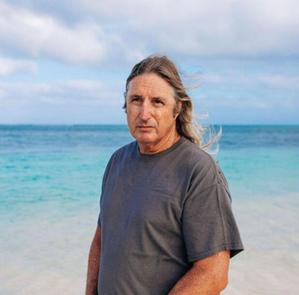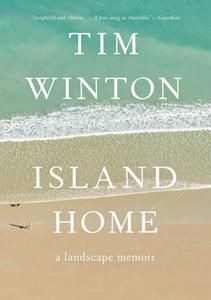I'm increasingly mindful of the degree to which geography, distance and weather have molded my sensory palate, my imagination and expectations. The island continent has not been mere background. Landscape has exerted a kind of force upon me that is every bit as geological as family. Like many Australians, I feel this tectonic grind--call it a familial ache--most keenly when abroad.
--Tim Winton, Island Home: A Landscape Memory (Milkweed Editions)

|
|
| Tim Winton | |
It's been a good week. I learned that one of my favorite writers, Tim Winton, will be inducted by the Australian Publishers Association into the Australian Book Industry Awards Hall of Fame later this month as recipient of the 2023 Lloyd O'Neil Award, which honors outstanding service to the country's book industry. The influence of Winton's writing "has seeped into our collective consciousness, reflected in conversations from the arts, education and community activism to the environment and marine conservation," ABIA noted.
"It's a lovely thing to be honored by the writers, publishers and booksellers who keep our precious book culture alive, and I'm really touched to be given this award in my 40th year in the caper," Winton said.
One of those booksellers, Keith McLeod of Margaret River Bookshop, observed: "I feel, like many Australians who read Tim Winton, a connection to his work: the landscapes, the ocean, the people and his evocative rendering of all this. As readers we can springboard off this great connection and travel the real and imaginary landscape to discover what we have, what we understand, or have yet to learn about what we have. It's a source of pride to have his books in our shop."
 Reflecting upon a lifetime's work as a Western Australian author who stayed home rather than be lured by the bright lights of Sydney/Melbourne, much less New York/London, Winton told WAtoday that supporting Australian publications is key: "These are the people pushing our culture forward. Publishing and bookselling--and writing--are part of a living ecosystem and we should be proud of it.... The writing community are writing for love more than money--if it was about the money they'd all be gone and you'd be reading exclusively American and English books. So support that local community bookstore just as you support any other community store--they care and they make a difference."
Reflecting upon a lifetime's work as a Western Australian author who stayed home rather than be lured by the bright lights of Sydney/Melbourne, much less New York/London, Winton told WAtoday that supporting Australian publications is key: "These are the people pushing our culture forward. Publishing and bookselling--and writing--are part of a living ecosystem and we should be proud of it.... The writing community are writing for love more than money--if it was about the money they'd all be gone and you'd be reading exclusively American and English books. So support that local community bookstore just as you support any other community store--they care and they make a difference."
I've read most of Winton's books since opening my first, Breath, in 2008. I can't believe it took me that long to "discover" a major international author, but it did. Shame on me, though late converts are often the most passionate followers.
Also this week, I saw that BookPeople, the Australian independent booksellers association, had released a paper, The Importance of Imagination: Understanding the state of Australia’s imagination and the role reading plays in fostering creativity. It was commissioned by BookPeople and conducted in partnership with research agency YouGov.
"Analysis of the research has highlighted that there is a growing concern about the level in which we use our imagination in our day-to-day lives, with many Australians expressing their desire to use it more," writes BookPeople CEO Robbie Egan in the foreword, adding: "Books and reading give us access to infinite worlds, past and future histories, and are the best medium for exploring narratives and ideas. Whether we read for entertainment or information, reading generates a net benefit for our mental health and our understanding of the world."
The research reveals that 94% of Australians acknowledge imagination is important, with 22% claiming they get to use theirs all the time while 8% rarely or never get to use it. More than 60% said they would like to use their imagination more within daily life.
Reading is cited as the best way to foster imagination. Among those Australians who claim they would like to use their imagination more, 45% would like to read more books and 92% believe reading is one of the best ways to foster imagination. The top benefits mentioned include "an increase in knowledge and understanding of new things" (58%), "stimulation of thinking" (57%), and "allowing people to escape from everyday mundanity" (58%).
Barriers holding people back from being more imaginative were also explored. The perceived ramifications of a lack of imagination appear to be severe, with Australians reporting that it hinders advancements and innovation more broadly, as well as contributing to cognitive decline, the paper noted.
Imagine this...
In addition to being one of Australia's great authors, Tim Winton is a lifelong surfer. "Waiting sharpens the senses," he writes in Island Home, and he could be talking about writing, about reading, about imagination.
On the surface of his brief sentence, he's contemplating the time spent waiting patiently to catch the right wave. Beneath the surface there's so much more at stake. "This was how I came to understand nature and landscape," he continues. "By submitting. And by waiting. Waiting sharpens the senses. Which is to say it erodes preconceptions and mutes a certain kind of mental static; the clutter and glare in the foreground recede. Immersion and duration are clarifying. While waiting for the next set, for the wind to change, or the tide to turn, I had thousands of hours in which to notice things around me."
Imagine that.

